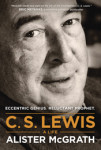In the eleventh century, Anselm and theologians like him began to interact with a larger world of ideas, specifically the Muslim theologians who were challenging some of the central tenets of the Christian faith. In the centuries previous, theology had largely been an increasingly ad intra discussion among the theologians of Christendom. As Muslim writings (and even the occasional Muslim thinker) began their movement into Europe, they began to challenge theological positions which had been taken for granted. It is in … [Read more...] about Cur Deus Homo. An Advent Devotional
Mere Christianity
Re-Examining Lewis’ Trilemma
In the world of apologetics, there are few arguments more famous than C.S. Lewis' trilemma, which is found in his most popular apologetic work, Mere Christianity. Even classic arguments like Anselm's famous ontological argument for the “being greater than which nothing can be conceived” and Pascal's wager, while still part of the discussion of apologetics, have not in recent years been as popular, or reviled, as Lewis' trilemma. It even spawned a book (Josh McDowell's More Than a Carpenter) and a song (Dana Key's “Liar, … [Read more...] about Re-Examining Lewis’ Trilemma
Review of Alister McGrath, C.S. Lewis — A Life. Part II
Review of Alister McGrath, C.S. Lewis -- A Life: Eccentric Genius, Reluctant Prophet (Carol Stream, IL: Tyndale House, 2013) for the Emerging Scholars Network (ESN). Part II. Click here for Part I. Things which I felt did not work: Moving on to things that I found difficult about the work, I think the biggest thing was that the writing style was confusing to me. At times, McGrath seemed to fall into the awkward habit in his writing style of announcing his transitions in a way that seemed unnecessary. For … [Read more...] about Review of Alister McGrath, C.S. Lewis — A Life. Part II
Review of Alister McGrath, C.S. Lewis — A Life. Part I
Review of Alister McGrath, C.S. Lewis -- A Life: Eccentric Genius, Reluctant Prophet (Carol Stream, IL: Tyndale House, 2013) for the Emerging Scholars Network (ESN). Part I. Click here for Part II. Alister McGrath is, like many of us, a fan of C.S. Lewis who never had the opportunity to study under or even met him. Although McGrath probably shares more similarities with Lewis than you or I, as someone raised in the same part of Ireland as Lewis and educated in Oxford, he thinks this distance will allow him the … [Read more...] about Review of Alister McGrath, C.S. Lewis — A Life. Part I
Why You Must Be Dying to be a Christian Scholar (2/2)
Last week I began to introduce myself and my understanding of the Christian scholar's vocation by briefly outlining the controversy which marked my time as a student at Westminster Theological Seminary. (You can read last week's post here.) This week I would like to share what I think were some of things I learned about the challenge of Christian scholarship from my time at Westminster. I should make it clear that my interest is not specifically in the challenge of doing serious scholarship within a confessional … [Read more...] about Why You Must Be Dying to be a Christian Scholar (2/2)



